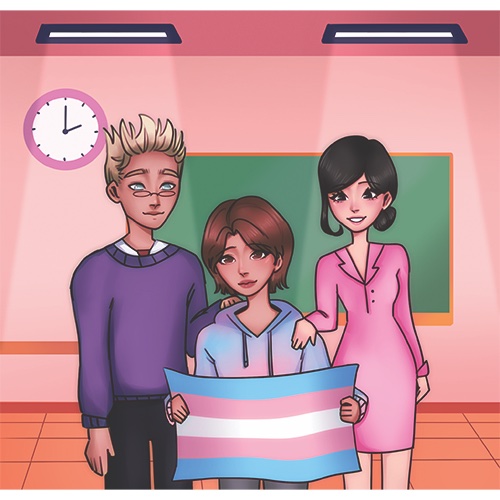The first bill in the country that would prohibit schools from disclosing a student’s sexual orientation, gender identity or gender expression without consent became law in California on July 15 when Gov. Gavin Newsom signed California State Assembly Bill 1955.
The bill was first proposed by Assemblymember Chris Ward (D -San Diego) and is the first bill in the country to outlaw such outings.
Ward’s LGBTQ caucus consultant Natalia Garcia, who worked on AB 1955, said the bill was created to expand on the state’s current LGBTQ+ protection laws.
“Nationally, for a couple of years now, there’s been a growing attack on LGBTQ folks,” Garcia said. “(In 2023), over 500 anti-LGBTQ+ legislation throughout the nation passed. Kids have the right to come out to their parents on their own time, in their own manner. Frankly, schools shouldn’t be getting involved in family matters, such as talking about gender and sexual orientation.”
Among the states with new LGBTQ+ legislation, eight have passed forced outing laws for transgender students, meaning, unlike California’s new law, teachers must notify a student’s parents if they identify with a gender that does not align with their sex at birth.
In March of 2023, Assemblyman Bill Essayli proposed California State Assembly Bill 1314, which would require school faculty to notify parents about gender identity changes within three days. Garcia said the potential that the California legislature could pass forced outing legislation concerned LGBTQ+ students and their supporters, prompting AB 1955.
“There was an increase in mental health issues amongst LGBTQ or a bunch of students in general and increased calls to the crisis hotlines because people were stressed about the implications of forced outing policies and the rhetoric that was around it,” Garcia said.
History teacher Eric Bloom said he’s thankful for the new law since he said forcible outing would obstruct an inclusive and safe learning environment in the classroom.
“It would be a very difficult law because it counters building an atmosphere in my classroom,” Bloom said. “I’m not hired just to teach — I’m hired to create a learning environment. I’m going to create a space here that is going to be the most productive for as many kids as I can.”
Sophomore Summer Mehta, co-president of the Gender Sexuality Alliance club, is also thankful the law passed and said AB 1955 provides students with a safe school environment that protects their identity.
“Whether it’s for safety, because of familial disowning or the hatred that comes from less-inclusive parents when they realize they have transgender children, allowing students to be able to express their gender identity in schools without the fear of being outed is really important,” Mehta said.
While the bill prevents school board members or administrators from requiring the outing of transgender students, Garcia said teachers can still out students under certain circumstances.
“(If) a student is a threat of harm to themselves or to others, or the student is getting bullied, the teacher is going to want to tell the parents what’s going on to ensure the health, safety and well-being of the student,” Garcia said. “Teachers are professionals that use their best judgment on conversations, not just as it relates to forced outings, but to threats of safety and what not.”
In fact, Garcia said creating a safe environment for students is one of a teacher’s primary responsibilities.
“To make a safe and supportive environment, (teachers) really need to make sure that kids aren’t singled out,” Garcia said. “It’s simply by using a kid’s proper pronouns or simply referring to a kid by their name. Teachers use kids’ nicknames all the time, even if it’s not their legal name. Just basic human dignity is really how teachers can create a safe and supportive environment.”
Mehta said most Paly teachers provide an inclusive environment for LGBTQ+ students and simple acts can go a long way in helping students feel even more comfortable.
“The majority of them are very inclusive,” Mehta said. “It could be as easy as having a poster with a pride flag on it to show your allegiance or your allyship — to show that it’s a safe space. Surveys are very helpful as well as just respecting pronouns, especially if a student transitions within high school.”
Fletcher teacher-librarian Kristen Lee, who serves on Palo Alto Unified School District’s LGBTQ+ Council and is Fletcher’s GSA advisor, said clubs like Mehta’s GSA, are important resources in supporting transgender and LGBTQ+ students.
“GSA needs to be active, present and visible so that kids know that there is a group of students, allies and faculty members seeing and hearing what they have to say,” Lee said.
In addition to AB 1955, Garcia said legislation also requires the state to provide families with the proper resources to support their kids regarding gender and sexual identity.
“There’s families that do want to work on supporting their kid and family acceptance and maybe just don’t know how to have those conversations or how to go about it,” Garcia said. “We (now) require the Department of Education to develop, in collaboration with parents and families, a list of community resources and support that parents in and throughout California can use to support their kid.”


